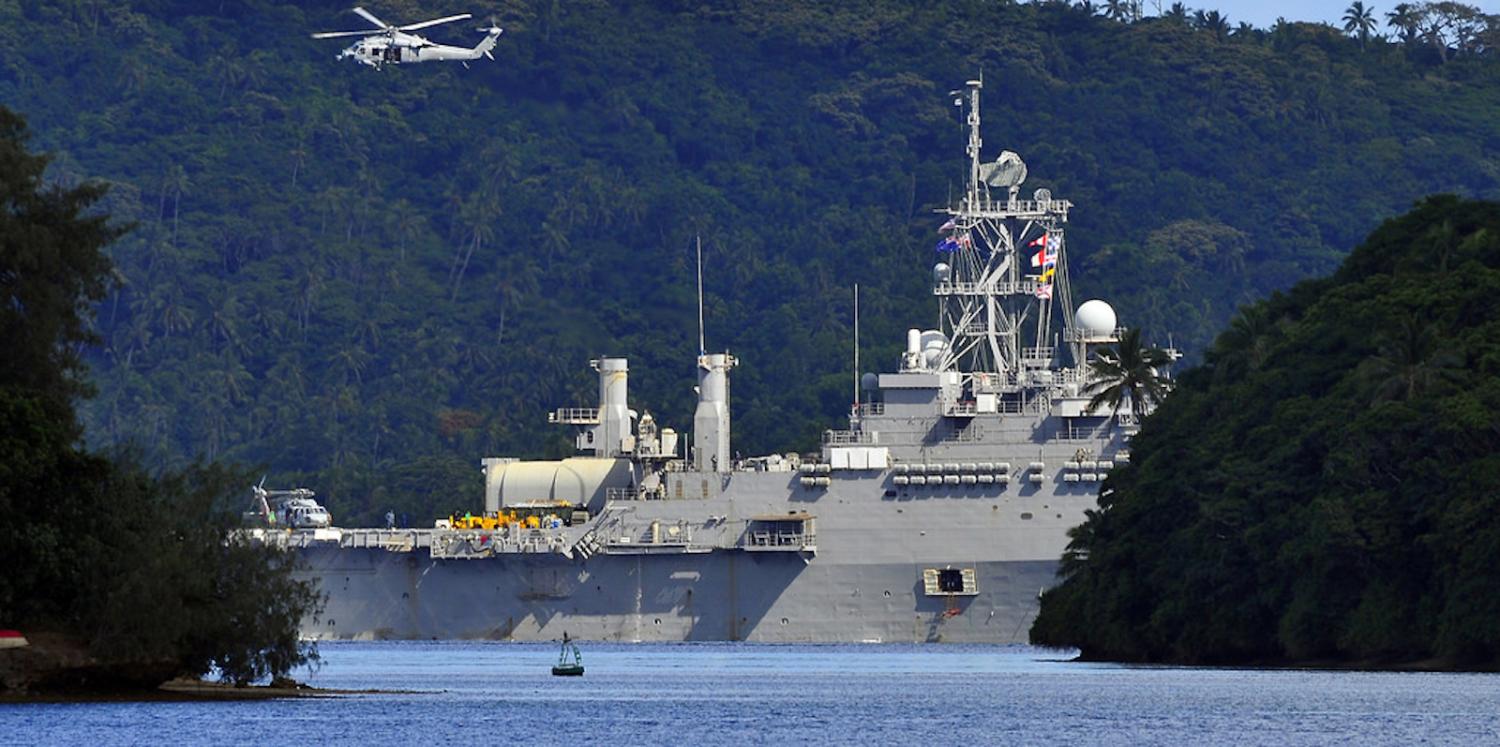As an onlooker at the intensifying debate about security in the Pacific islands, I see the danger of a widening paradigm gap between how Australia’s strategic community perceives the region, and how security is conceived by islanders themselves, as well as scholars of the region.
Two distinct paradigms define security across the Pacific islands region, incorporating Melanesia and Polynesia.
Canberra needs to be alive to the worst-case scenario that the region could again become an active battleground if China proceeds on its current course unchecked.
First, there is a “non-traditional” perspective, focused on broad-spectrum policy challenges affecting small island states and their societies. This paradigm has become the prevailing orthodoxy among Pacific islanders and academic specialists. Security is envisioned in terms of common developmental and governance challenges affecting island countries, highlighting transnational and environmental stresses.
Its influence is evident in the Boe Declaration, endorsed at last month’s Pacific Islands Forum (PIF), in Nauru. While the Declaration references “traditional” security in passing, the emphasis is on an “expanded concept of security”, spanning human security, including humanitarian assistance, environmental and resource security, transnational crime, and cybersecurity.
Scholars of the region have largely adopted a sympathetic focus, as seen here and here. Climate change is identified as the main global level challenge bearing upon the region; a particular point of tension with Canberra given Australia’s reliance on fossil-fuel exports and the government’s ambivalence about emissions targets. Regional experts often suggest that Canberra should be “singing from the same song sheet” as the Pacific, especially on issues such as climate change.
A second, long-dormant paradigm views Pacific islands and surrounding waters primarily through a geostrategic lens, in an environment increasingly defined by major power competition. Geopolitics has never been entirely absent from the region, as witnessed in the on-again, off-again battle for diplomatic recognition between China and Taiwan.
But geostrategy has lately “returned” to the region, as China’s burgeoning Pacific profile has acquired sharper purpose and latent strategic intent.
Canberra is increasingly concerned about Beijing’s intensified interest in the Pacific islands, including efforts to sway political elites and targeted pursuit of transportation infrastructure projects in locations across Melanesia. It is becoming a settled view within government, in Australia and the United States, that Beijing has strategic designs on the so-called “second island chain”, including ambitions to establish some form of military base, potentially upsetting the Western powers’ “traditional” pre-dominance that has existed without serious challenge since 1945.
Both security paradigms have their validity. The non-traditional paradigm is naturally favoured by Pacific islanders themselves, as the focal point of “human security”. Scholars of the Pacific have tended to mirror this, embracing the conceptual “securitisation” of broad-spectrum policy challenges, just as non-traditional security has become ensconced as orthodoxy elsewhere, in Southeast Asia for example.
The geostrategic paradigm approaches the islands as more akin to positional “real estate”, the military value of which is now rising, as the trans-Pacific power balance shifts in China’s favour. This tends to alienate islanders and experts alike, by relegating small island states to the status of pawns in a great power game.
So, what needs to change?
Australia, as is often reminded, should give appropriate weight, as part of its Pacific “step-up”, to tackling non-state security challenges that align with the concerns of Pacific islanders. This applies especially in areas such as maritime security that empower the region to become more resilient and economically self-sustaining (as discussed in the Lowy Institute analysis Stronger together: safeguarding Australia’s security interests through closer Pacific ties).
Equally, in a point not stressed often enough, islanders and regional scholars also need to adapt their prevailing non-traditional security paradigm to take account of Canberra’s legitimate geostrategic concerns.
Canberra needs to be alive to the worst-case scenario that the region could again become an active battleground if China proceeds on its current course unchecked. Short of armed conflict, Beijing’s strategic attention and largesse towards the region carries potential downsides, beyond indebtedness, in terms of compromised sovereignty, and increased foreign interference and influence.
The inclusion of cybersecurity as a priority area in the Boe Declaration is welcome in the latter regard, as was the public commitment of PIF leaders to being “free of external interference and coercion” – a phrase that seems to hint strongly at China.
Pacific experts need to maintain an open mind to interpreting China’s activities through a more strategic lens. The academic community must not serve simply as an echo chamber for islander sentiments, it can also help to raise local awareness of strategic risks, as well as opportunities.
The widely anticipated establishment of a joint Australia-PNG naval base on Manus Island will be a key test, and opportunity, for Australia to demonstrate security benefits that are both strategic and localised in nature. Canberra already helps PNG and other Pacific countries to safeguard their maritime resources, through the gifting of patrol boats as sovereign assets.
PNG’s Lombrum Naval Base has been recently upgraded to operate the new Guardian-class patrol boats. A revived Australian naval presence on Manus needs to be guided by a properly joint ownership philosophy from the start. Lombrum should be mandated to function as a maritime security hub for other island countries, including training.
The strategic quid pro quo for Canberra is twofold: denying a prime operating location to China in Australia’s northeastern approaches is beneficial in itself. Operating forward from Manus will also act as a force multiplier for Australia and potentially the US Navy, cutting transit times and facilitating more regular deployments into Southeast Asia and the Western Pacific.
Security practitioners and scholars need to do what they can to close the Pacific paradigm gap, to prevent a false dichotomy from becoming established. Otherwise, security cooperation between Australia and island states will inevitably be impaired, at a time when it is critically important for both sides.


